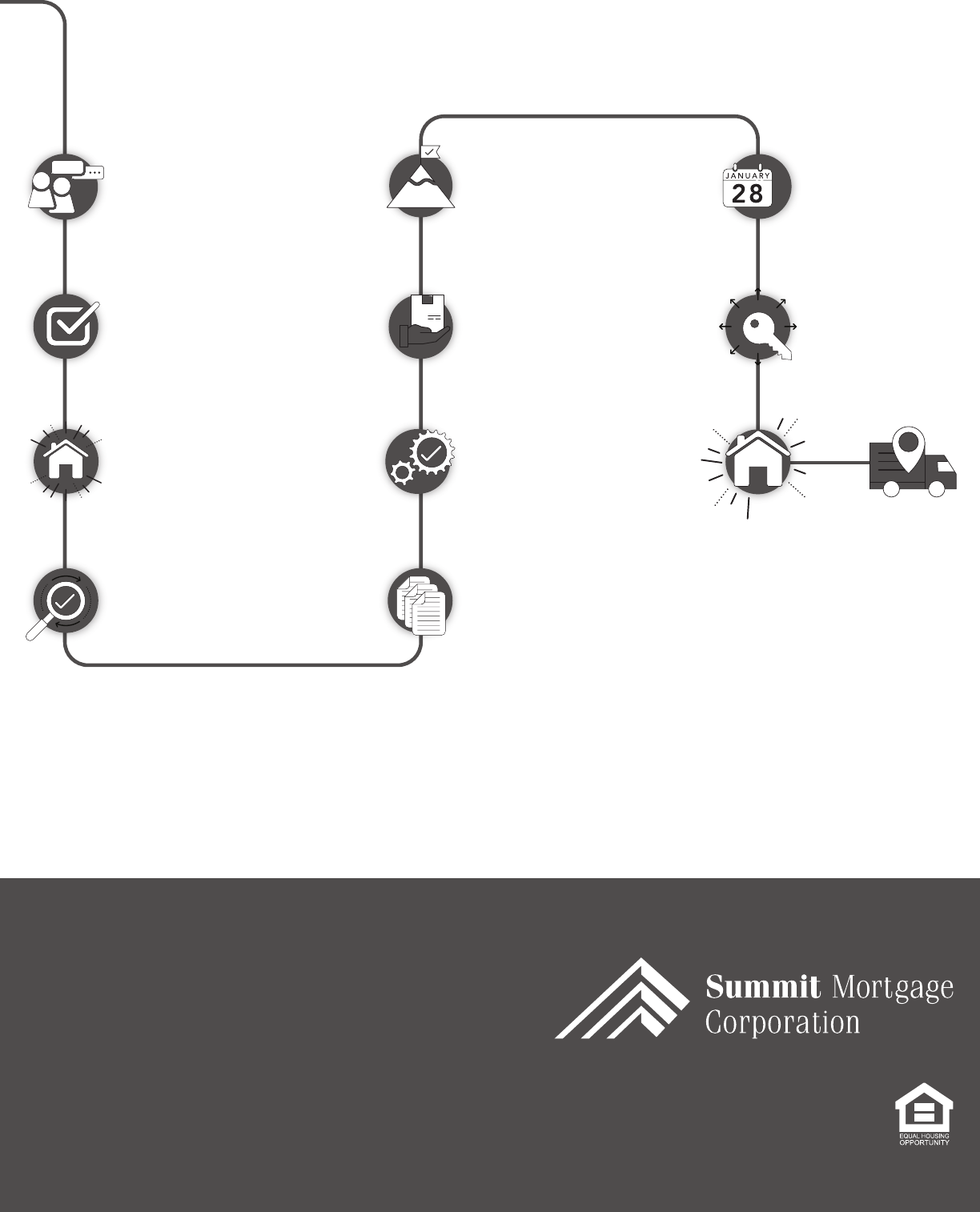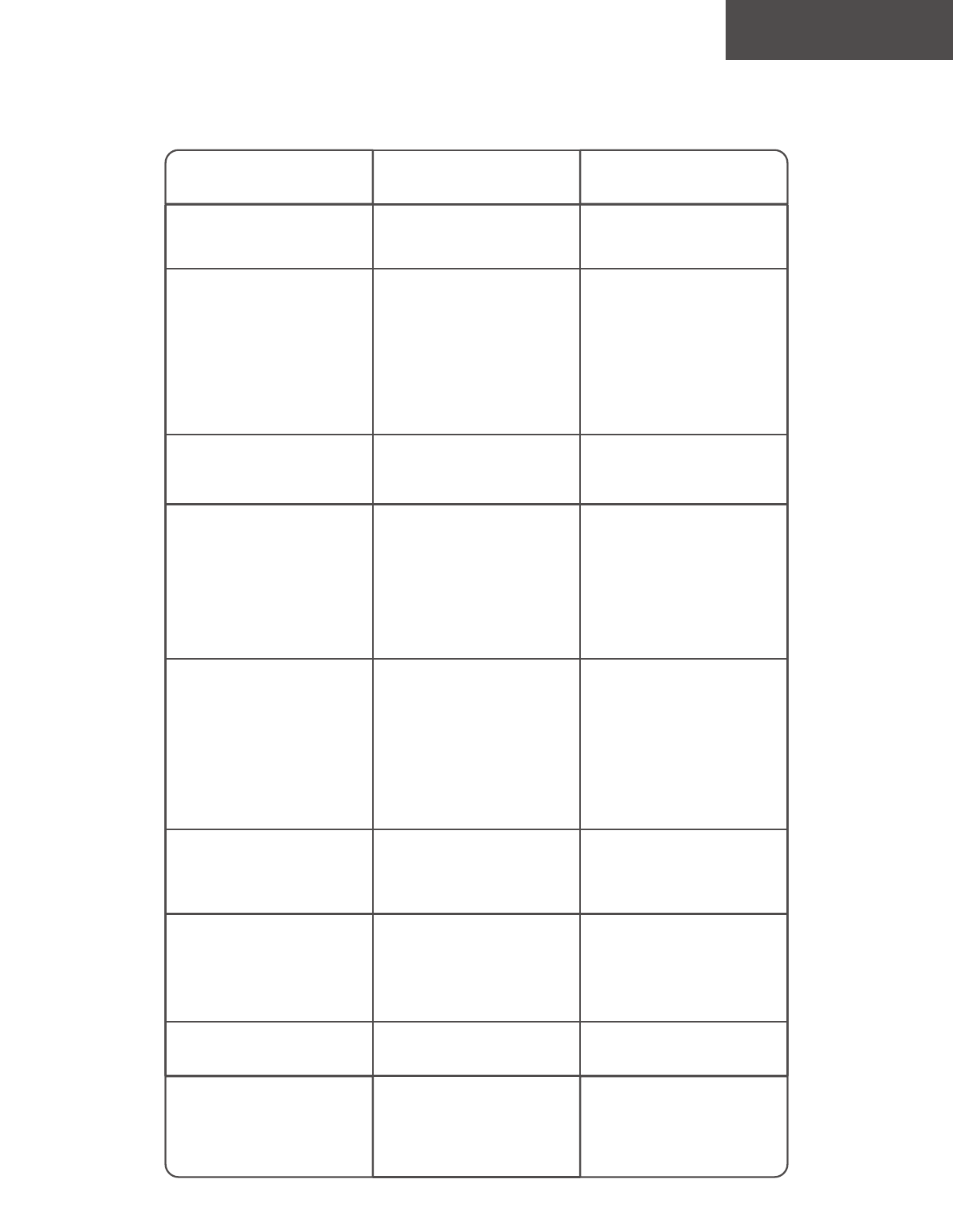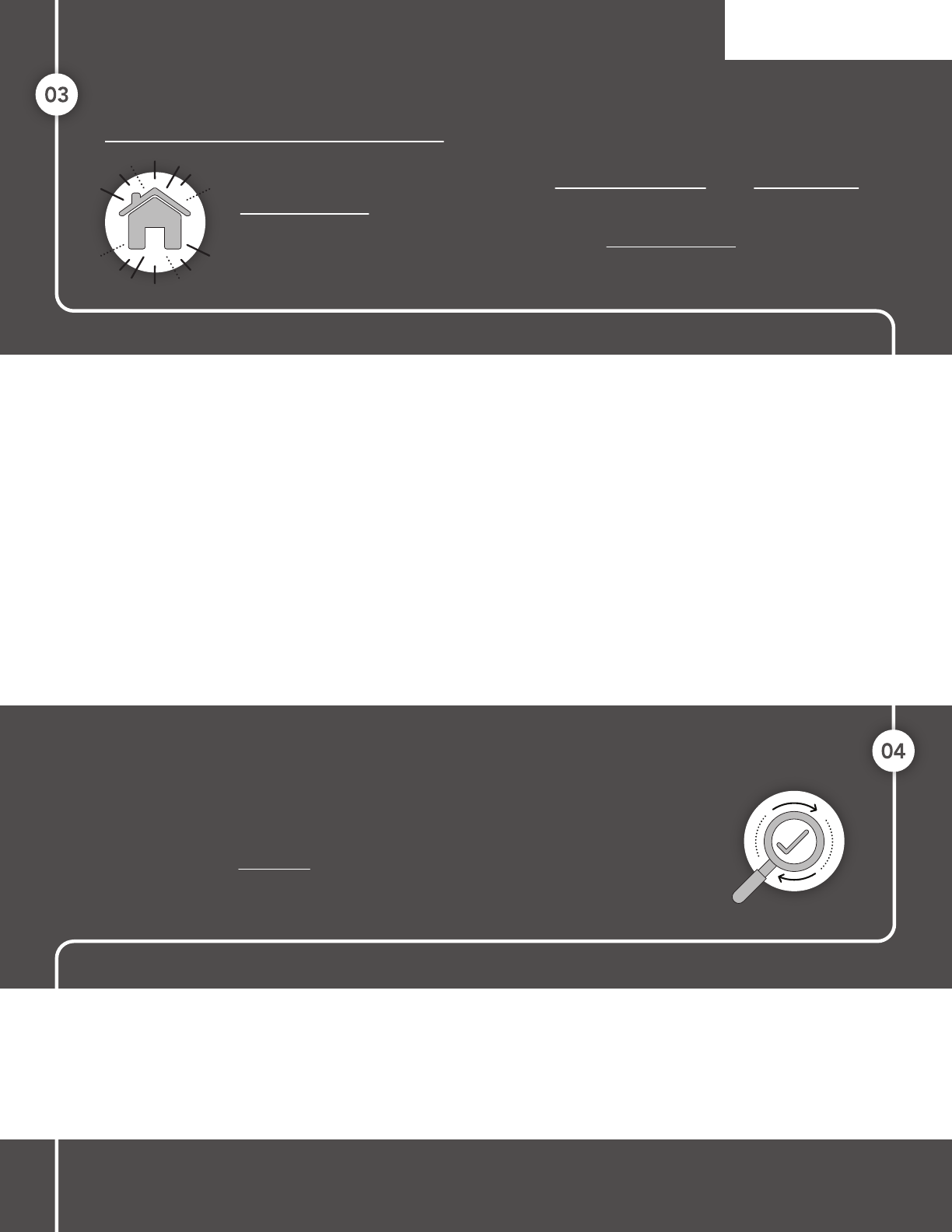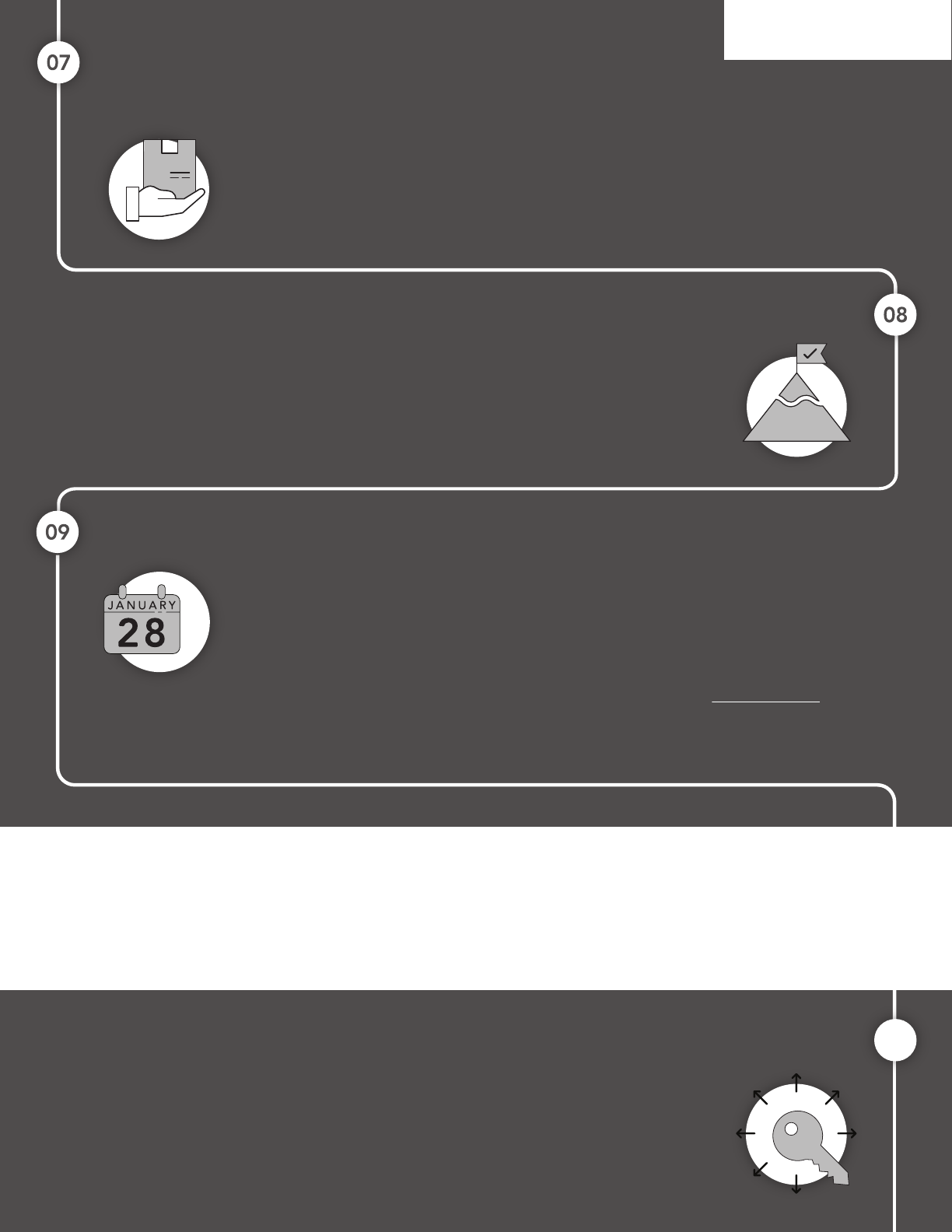
NEW HOME BUYER Guide
Use this helpful guide to educate yourself on the homebuying
process and learn very useful tips to make the process easy!
????
1. INITIAL
CONSULTATION
2. PRE-APPROVAL
3. FINDING
YOUR HOME
4. APPRAISAL
6. UNDERWRITING
APPROVAL
7. CLOSING
PACKAGE
8. CLEAR
TO CLOSE
9. NUMBERS
REVIEW
10. CLOSING
DAY!
NMLS# 1041. This is not an offer to enter into an agreement. Any such
offer may only be made in accordance with the requirements of MN.
Stat. Section 47.206 (3) and (4)”
5. PROCESSING
SOLD
PRO TIP: Ask your Realtor
®
about getting an Inspection!

????
INITIAL CONSULTATION
Your current financial situation is discussed
We will inquire about your income, assets, liabilities and credit so we can assess your
current debt-to-income ratio and determining a qualifying payment or purchase price.
GETTING PRE-APPROVED
Provide all requested documentation (a list of typical documentation
follows on page 3 of this guide).
Pre-approval is needed for you to start shopping for the home that fits your needs.
We will discuss specifics with you including your credit score, PITI including PMI,
escrow payment and the best loan type.
DEBT-TO-INCOME RATIO: This is a key ratio used to determine the amount of money you can borrow. It is your monthly
payment obligation divided by your gross monthly income.
CREDIT SCORE: Your credit score could mean the difference between being denied or approved for a
home loan, and how low or a high of an interest rate. There are 3 major credit bureaus: Equifax,
Experian, and Transunion. Data from your credit score is categorized into 5 major elements that make
up your credit score: payment history, amounts owed, length of credit history, new credit and types of
credit used. For example even if you have paid your outstanding credit on time but every account you
have is used to the maximum amount, your scores will be lower than someone who has high maximum
credit but lower balances on each.
PITI: An acronym for the total mortgage payment, which is made up of Principal, Interest, real estate
Taxes and Insurance.
PMI (PRIVATE MORTGAGE INSURANCE): Insurance provided by a private company to protect the
mortgage lender against losses that might be incurred if a loan defaults.
ESCROW PAYMENT: An amount paid with monthly mortgage payment for items such as taxes or
homeowners insurance.
PAGE 1

LOAN TYPE: There are many types of mortgages available. Your Summit Loan Officer will help you understand
your options so that you can make an informed decision. Use this table as a guide:
LOAN TYPE
FIXED RATE MORTGAGE - the
interest rate stays the same for
the life of the loan
ADJUSTABLE RATE MORTGAGE
(ARM) - the rate may go up or
down on pre-determined dates
reflecting current market
conditions
FHA LOAN - The Federal Housing
Administration designed these
loans to meet the needs of low or
moderate incomes
VA LOANS
- The Department of
Veterans Affairs guarantees loans
for qualified veterans
USDA LOANS
- Guaranteed by
the US Department of Agriculture
CONVENTIONAL LOANS -
Fannie Mae, Freddie Mac
Conforming & Non Conforming
HOMEREADY &
HOMEPOSSIBLE
HOMEPATH - Fannie Mae REO
properties
DOWN PAYMENT ASSISTANCE
PROGRAMS - funded by private
and public partnerships,
organizations either state, county
or city sponsored, non-profit
entities, etc.
FEATURES
Predictable monthly payments
Rate will remain the same over
the entire term.
The initial interest rate is generally
lower than that of a fixed rate.
The initial interest rate is locked in
for a fixed period of time.
There are different introductory
periods of time to choose from
ex. 5yr, 7yr, 10yr
After the introductory period the
rate can adjust every year.
Low 3.5% minimum down
payment required.
Flexible qualifying guidelines.
Gift funds can be used for all or a
portion of the down payment and
closing costs.
Low or no down payment.
Flexible qualifying guidelines.
Property must be located in
qualifying rural area.
Maximum income based on
geographic area.
There is an upfront Mortgage
Insurance fee and a monthly MI
fee.
Low down payment with
mortgage insurance on
conforming loan limits.
No MI with 20% down.
More strict qualifying guidelines.
Low down payment, lower
mortgage insurance than
traditional conventional loans.
At least one borrower must
complete home buyer education.
Low down payment, no mortgage
insurance, no appraisal.
Low down payment first
mortgages or stand alone 2nd
mortgages.
Income limitations.
WHO MAY BENEFIT
This type of loan is chosen when a
buyer plans to remain in the home
for a long period of time.
This type of loan is chosen by a
buyer who plans to refinance or
sell the home in a few years or can
make a larger monthly payment if
the rate adjusted upwards.
For example: maybe a spouse is
in school and will be getting a job
in a year or two, promotion, etc.
This type of loan is often chosen
by a buyer looking to put less
money down.
Available to active-duty or veteran
military service members.
Un-remarried surviving spouses of
a veteran who died from
service-connected injuries or
un-remarried surviving spouse of
a veteran who was totally disabled
at the time of death may also
qualify.
This type of loan is often chosen
by a buyer looking to put less
money down.
This type of loan is often chosen
by a buyer with more money to
put down and lower debt to
income ratios.
This type of loan is often chosen
by a buyer with lower to moderate
income.
This type of loan is often chosen
by a buyer wanting to purchase an
REO (Real Estate Owned) property.
This type of loan is often chosen
by a buyer needing assistance
with down payment and closing
costs.
PAGE 2

PAGE 3
REQUESTED DOCUMENTS LIST
YOUR SOURCE OF INCOME - HOW YOU’LL PAY YOUR MORTGAGE
EVERYONE
□ Federal Tax Returns (All pages)
□ Child support/alimony (if using income to qualify): court order or 12 months cancelled checks or bank
statements showing consistent deposits
□ Award letters for social security, pension, disability, etc.
W-2 WAGE EARNERS
□ Pay stubs for the last 30 days (if your income includes overtime, bonuses or differential pay, you may
need your most recent end-of-year payroll stub)
□ W2’s for the last 2 years
□ Written explanation if employed less than 2 years or a 30 day gap in the last 2 years.
SELF-EMPLOYED
□ Self-employed documentation
□ Year to date profit and loss
□ Year to date balance sheet
□ List of all business debts
□ Evidence business pays debts
YOUR ASSETS - HOW YOU’LL FUND YOUR DOWN PAYMENT
□ Original bank statements for last 2 months (checking, savings, and investment accounts)
□ Original account statements for last 2 months (stocks and investments)
□ Settlement statement (if using funds from the sale of a property)
□ Sale of assets (proof of ownership, proof of sale, proof of funds transferred to you)
YOUR PAYMENT HISTORY - TO REVEAL YOUR BORROWING PRACTICES
□ Cancelled rent or mortgage checks for the last 12 months, if not available on credit report
□ Bankruptcy discharge paperwork
□ Proof of paid off collections/judgments
ADDITIONAL INFORMATION - IF APPLICABLE
□ Purchase agreement including legal property description and any addendum
□ Discrepancies on credit including explanation of discrepancies
MISCELLANEOUS - IF APPLICABLE
□ _______________________________________________________________________
□ _______________________________________________________________________
□ _______________________________________________________________________
The detailed list above is only partial. As mortgage industry technology improves, more lenders will be
able to obtain many of the documents above from their sources (with your authorization) rather than
getting paper, emails, or uploads from you.
Improved technology may help with convenience, but it won’t reduce the documentation needed, so this
list provides the proper perspective of what goes into a loan approval.

FIND YOUR HOME, MAKE AN OFFER, SIGN THE
PURCHASE AGREEMENT
Your Realtor
®
will ask you about earnest money and seller paid
closing costs.
You will also be asked if you would like to order a home inspection. Your Realtor
®
will assist
with ordering this and will let you know the upfront cost of the inspection.
PURCHASE AGREEMENT: This is the document received after mutual acceptance on an offer, which states the
final sale price and all terms of the purchase. The specific items in this contract vary by state.
EARNEST MONEY: Buyer pays this to the seller before closing to ensure the buyer’s seriousness about
purchasing the home. This money is not an additional cost and will be deducted from the purchase price at
closing.
SELLER PAID CLOSING COSTS: Closing costs associated with your loan that are paid by the seller’s proceeds
to reduce out-of-pocket expenses for you.
HOME INSPECTION: Your home inspection should be performed by an inspector that educates the buyer
about the condition of the home and its major components. Obtaining a home inspection will provide details on
the home's condition with an eye toward both existing and potential future problems.
Once your offer is accepted your new home will need to be
appraised by a qualified appraiser.
The home appraisal is a key component to your home buying transaction.
HOME APPRAISAL
APPRAISAL: An appraisal provides valuable information for the buyer, but the appraiser's primary mission is to protect
the lender. Lenders can’t lend more money than the property is worth and that's why the appraisal takes place before the
lender grants final approval of the buyer's loan. The appraiser surveys the physical condition of the home and runs a
comparative analysis of similar homes recently sold. A copy of the appraisal report is always provided to the buyer.
PAGE 4

Keep in mind the underwriter may request a few additional items for
review prior to issuing the final approval.
This is a normal part of the process, so don’t let this worry you. If you have been requested
to submit additional documents, be sure to get everything back within 24 hours so there
are no delays with your closing.
Once your offer is accepted we will also begin finalizing your
documentation and requesting updated documents including bank
statements, pay stubs and proof of your earnest money clearing
your account.
At this time you will also obtain homeowners insurance, consult with your loan officer
regarding locking in your interest rate and sign your initial disclosures.
Your file will be prepped for Underwriting.
INITIAL PROCESSING
FILE IS SUBMITTED TO UNDERWRITING FOR APPROVAL
UNDERWRITING: The process a lender uses to determine the risk of offering a mortgage loan to a particular borrower.
Most of the risks and terms that underwriters consider fall under the three C’s of underwriting: credit, capacity and
collateral. During this process the underwriter uses industry guidelines to analyze the various aspects of the mortgage
and provide recommendations regarding the risks involved. Ultimately, it is always up to the underwriter to make the final
decision on whether to approve or decline a loan.
PAGE 5
HOMEOWNERS INSURANCE: An insurance policy that combines various personal insurance protections, which can
include losses occurring to one's home, its contents, loss of use (additional living expenses), or loss of other personal
possessions of the homeowner, as well as liability insurance for accidents that may happen at the home or at the hands of
the homeowner within the policy territory. Let your insurance agent know coverage will need to meet 100% of the
insurable value of the property.
LOCKING IN YOUR INTEREST RATE: A rate lock is a guarantee from a mortgage lender that they will give you a certain
interest rate, at a certain price, for a specific time period.
A rate lock protects you from rising interest rates: If you lock in a rate of 4.75 percent, you only have to pay 4.75 percent
interest even if rates rise while you’re going through the loan application process. Usually, a rate lock is good for 30, 45 or
60 days, though that time period can be shorter or longer; once that period expires, you may be subject to
lock-extension fees.

You are so close to owning a home! Please be sure to stay in touch
with your loan officer about any last minute financial decisions.
A few days prior to closing, we will contact you with the final
numbers.
You will have specific instructions on whether to obtain a cashier’s check, who it should be
written out to or if a wire is needed for funds to close.
You will need to obtain this at least 1 day prior to closing. (Each title company has
different requirements as to whether they will accept a cashier’s check or if you need to
have a wire transfer.)
FINAL NUMBERS REVIEWED
Congratulations, it’s time to get your new keys!
Don’t forget your drivers license, your checkbook and your funds for closing.
You will sign all of the final disclosures; note and mortgage. We will be there with your title
agent to answer any questions. Once the documents are signed, the keys will be yours!
CLOSING DAY
YOU HAVE REACHED A HUGE MILESTONE!
The CD is sent to you, remember to sign this ASAP so there are no
delays with your closing.
This will go over the amount of money that is needed for closing and your
monthly payment.
CLOSING DISCLOSURE/CD SIGNED AND
CLOSING PACKAGE SENT TO THE TITLE COMPANY
TITLE COMPANY: The title company verifies ownership of the property and determines the valid owner through a
thorough examination of property records in a title search. The title search determines the legal owner of the property;
reveal any mortgages, liens judgments or unpaid taxes outstanding on the property and details any existing restrictions,
easements or leases that affect the property. The title search ensures you will be the legal owner of the property and we,
as your lender, will be in first lien position.
10
PAGE 6

PREPARING FOR YOUR MORTGAGE APPROVAL
Do’s and Don’ts before and during the loan process
GOOD HABITS: THE DO’S
DO: Keep paying your bills on time including any mortgage, car, credit cards, etc. even if
they’re being paid through the new loan.
DO: Inform us in advance of any employment or income change.
DO: Keep copies of all pay check stubs you receive.
DO: Call us before changing your marital status.
DO: Call us if you are going out of town or planning a vacation.
DO: Call us anytime if you are unclear or have a question about your loan.
POTENTIALLY HARMFUL: THE DON’TS
DON’T: Change your employment status or your pay scale, even if it seems good. This
could endanger your loan approval. Call us first.
DON’T: Buy new furniture for your home or anything where your credit report needs to be
pulled, including interest free credit at a furniture store. Hint: If they need your SSN,
they’re probably going to check your credit. Call us first.
DON’T: Start significant home improvements on your home.
DON’T: Payoff collections or charge-offs. From now on, don’t pay off collections unless we
specifically ask you to. Generally, paying off old collections causes a drop in the
credit score.
DON’T: Max out or over charge existing credit cards.
DON’T: Consolidate debt. Wait until after your loan closes.
DON’T: Close credit card accounts.
DON’T: Cosign on a loan, change your name, or address.
DON’T: Make large purchases such as real estate or vehicles.
DON’T: Move money around, open, or close accounts. Keep funds in one account.
DON’T: Make cash or unexplainable deposits into bank accounts.
NMLS# 1041. This is not an offer to enter into an agreement. Any such
offer may only be made in accordance with the requirements of MN.
Stat. Section 47.206 (3) and (4)”
